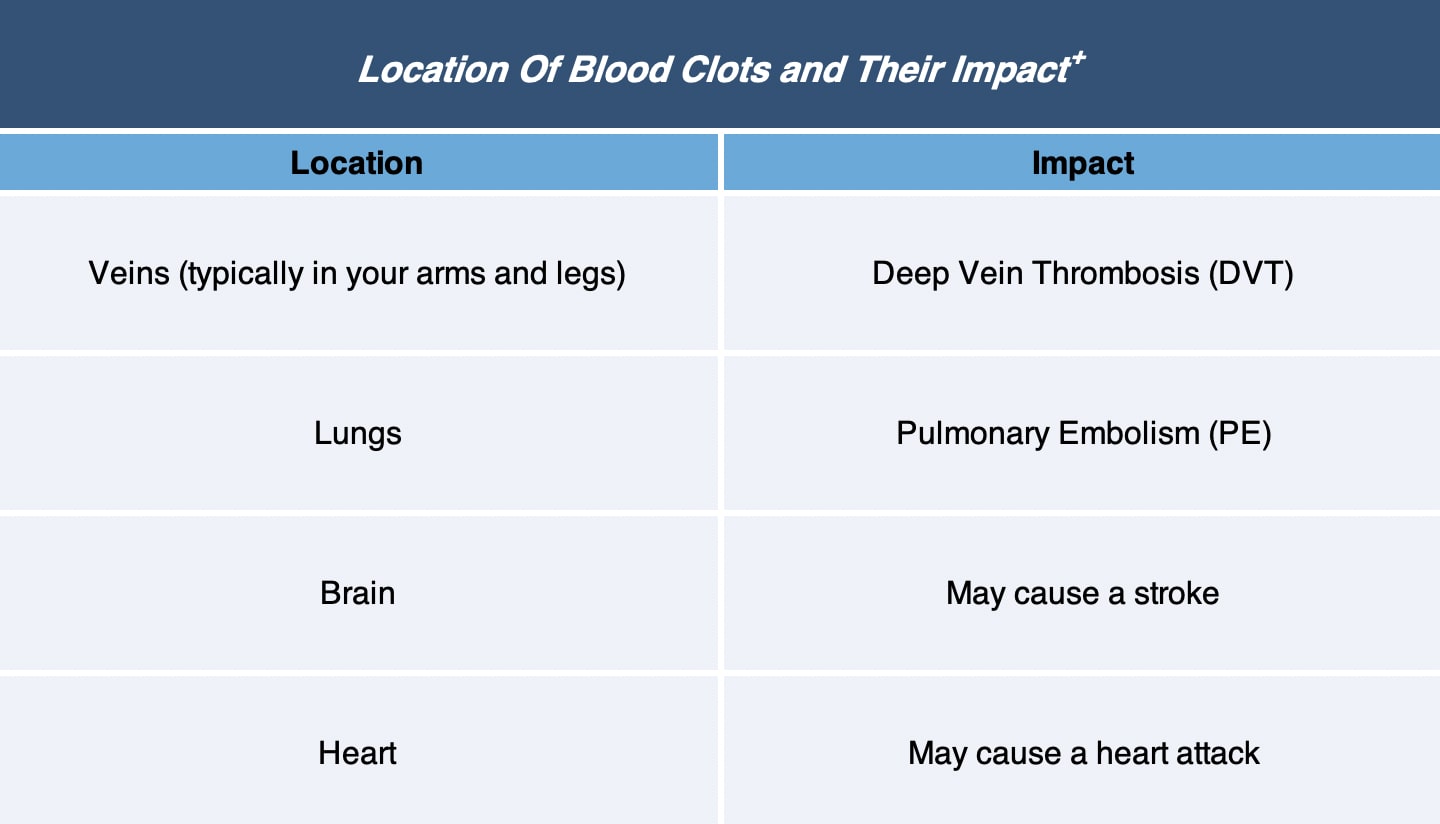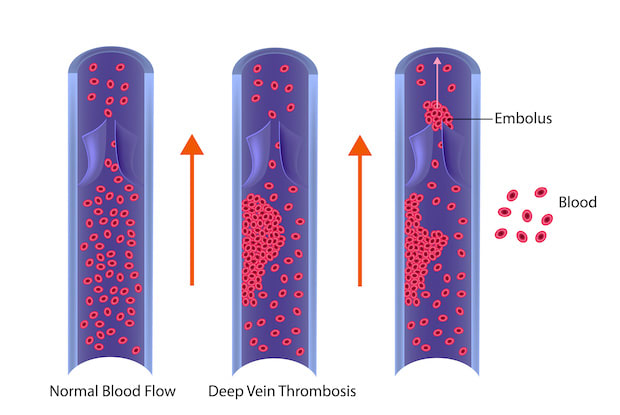Table of Contents
IV. Why Am I Prescribed Eliquis?
Are you curious about why you’ve been prescribed Eliquis?
We're here to help. In this article, we'll explore the world of blood thinners and shed light on the role of Eliquis in your treatment. We aim to empower you with all the information you need to actively participate in your health journey.
What Are Blood Thinners?
Contrary to what the name suggests, blood thinners don’t actually “thin” your blood. Instead, their main purpose is to prevent the formation of blood clots and stop existing clots from growing larger. [1] This is important in lowering the risk of life-threatening conditions like heart failure or stroke.
But what are blood clots, and why are they dangerous?
Blood clots themselves are not dangerous. Under normal circumstances, they serve as a natural defense mechanism when bleeding occurs. For example, if you’ve ever nicked yourself while shaving, you may have noticed the bleeding stops after a few minutes. This is because your body forms blood clots in response to the injury.
However, blood clots can become dangerous if they are too large, start to move away from the injury site, or develop in your bloodstream. A dangerous blood clot may block a smaller blood vessel, preventing blood from reaching your organs. [2]
Depending on where the blood clots form, different areas of your body may be affected:

+[2]
Blood thinners like Eliquis are prescribed to decrease the formation of blood clots in your body and minimize these risks. While they do not dissolve existing blood clots, they prevent them from growing larger. [2]
In the following section, we will explore the various types of blood thinners and discuss where Eliquis fits into the picture.
Types of Blood Thinners
When your doctor prescribes a blood thinner, it can be one of two types: anticoagulants (such as Eliquis) and antiplatelets (such as aspirin). [1] Both types work to decrease blood clotting, but they go about it in different ways.
In the following sections, we will dive into each type and break down how they work.
Anticoagulants
Anticoagulants slow down clot formation by targeting the body’s clotting factors [3].
For example, when you get a cut, your body initiates a natural process to form a clot and prevent excessive bleeding. However, in situations where unwanted blood clots can be dangerous, anticoagulants are used to prevent this process from occurring.
Antiplatelets
Returning to the shaving example: when you get a cut, your body sends tiny cells called platelets to the wound site. When the platelets are activated, they become “sticky” and clump together to stop the bleeding.
However, if this process leads to harmful blood clots, or if you’ve recently undergone surgery to put in a stent, your doctor may prescribe antiplatelets to prevent blockages by these sticky platelets. This reduces the risk of a stroke or heart attack. [4]
How Does Eliquis Work?
Eliquis is a part of the anticoagulant category of blood thinners. More specifically, it belongs to a class of drugs called “factor Xa inhibitors.”
Let’s break this down into more simple terms.
When your body wants to form a clot, many factors come together to make it happen. One of these factors is an enzyme called “clotting factor Xa.”
Eliquis blocks factor Xa, which prevents blood clots from forming.
Factor Xa is the preferred target for anticoagulants like Eliquis because the effects are predictable, and the patient doesn’t need routine monitoring. [5]

Why Am I Prescribed Eliquis?
Eliquis was approved by the FDA in 2012 for the treatment of select conditions:
- Treatment of Deep Vein Thrombosis (DVT)
- Treatment of Pulmonary Embolism (PE)
- Reduce the risk of blood clots after hip or knee replacement surgery
- Reduce the risk of stroke and blood clots in patients with non-valvular atrial fibrillation [6]
We’ll go into detail about each of these conditions in the next few sections.
Deep Vein Thrombosis (DVT) and Pulmonary Embolism (PE)
If you are diagnosed with Deep Vein Thrombosis (DVT) or Pulmonary Embolism (PE), your doctor may prescribe Eliquis to treat and prevent the reoccurrence of these conditions.
DVT occurs when a blood clot occurs in a deep vein in your legs, thighs, or hips. This clot can obstruct normal blood flow and cause symptoms like pain and swelling.
Furthermore, DVT can become life-threatening if the blood clot moves through your blood and travels to your lungs. This potentially fatal condition is called a pulmonary embolism.
While anyone can experience DVT, certain factors may increase your risk:
- Limited activity or being on bed rest
- Family history of blood clots
- Age 60 or older
- Diagnosis of heart failure or obesity
- Pregnancy or having given birth within the past six weeks [7]
To prevent the occurrence or reoccurrence of DVT and PE, Eliquis may be prescribed to prevent the formation of blood clots that may lead to these conditions.

After Knee or Hip Replacement Surgery
If you’ve recently had knee or hip replacement surgery, your doctor may prescribe Eliquis during your recovery. To minimize blood clots, your doctor or physiotherapist may also encourage you to start moving as soon as possible.
Let’s discuss why.
While recovering from surgery, you typically lay in bed for long hours. This position, coupled with a lack of movement, causes blood flow to slow down and form clots.
These clots may eventually block a vein and cause long-term damage to the valves. This condition is called deep vein thrombosis and can lead to pain and swelling.
If the clots start moving through your bloodstream, they may end up in your lungs and cause a more serious condition called pulmonary embolism. [8]
To reduce the risk of these conditions during your recovery, your doctor may prescribe a blood thinner like Eliquis to prevent the formation of clots.
Atrial Fibrillation
Atrial fibrillation is a condition where the upper heart chambers (the atria) and the lower heart chambers (ventricles) are not coordinated.
While atrial fibrillation is not life-threatening, it causes an irregular heartbeat that disrupts normal blood flow, leading to blood pooling in the atria and forming clots. If the clots begin moving away from the heart, they may negatively impact other areas of your body.
For example, a stroke may occur if the clots travel to and block blood flow in the brain. Clots traveling to your kidneys or intestines may block blood flow to these organs (this is called systemic embolism). Lastly, the blood clots traveling to the lungs may cause pulmonary embolism.
If you’ve been diagnosed with atrial fibrillation, your doctor may have prescribed you Eliquis to reduce the risk of stroke and heart failure caused by blood clots.
Final Thoughts
Eliquis is a powerful anticoagulant used in the treatment of blood clots. It not only helps prevent new blood clots from forming, but it also reduces the risk of current blood clots becoming larger.
However, while the medication has many positive attributes, it’s important to understand the risks associated with Eliquis. Awareness of these side effects will allow you to recognize if you need medical attention when the symptoms arise. Your doctor can guide and monitor your condition to ensure your safety throughout treatment.
At RxConnected, we understand that while Eliquis is a valuable medication in your treatment, its price at US pharmacies can cause concern for many patients. That’s why we offer both Eliquis and its generic version (apixaban) at a price point that’s 80% lower than your local pharmacy.
If you have any questions or concerns, please don’t hesitate to contact us. If you’re ready to buy Eliquis or apixaban, visit the medication page for more information.
The content in this article is intended for informational purposes only. This website does not provide medical advice. In all circumstances, you should always seek the advice of your physician and/or other qualified health professionals(s) for drug, medical conditions, or treatment advice. The content provided on this website is not a substitute for professional medical advice, diagnosis, or treatment.
